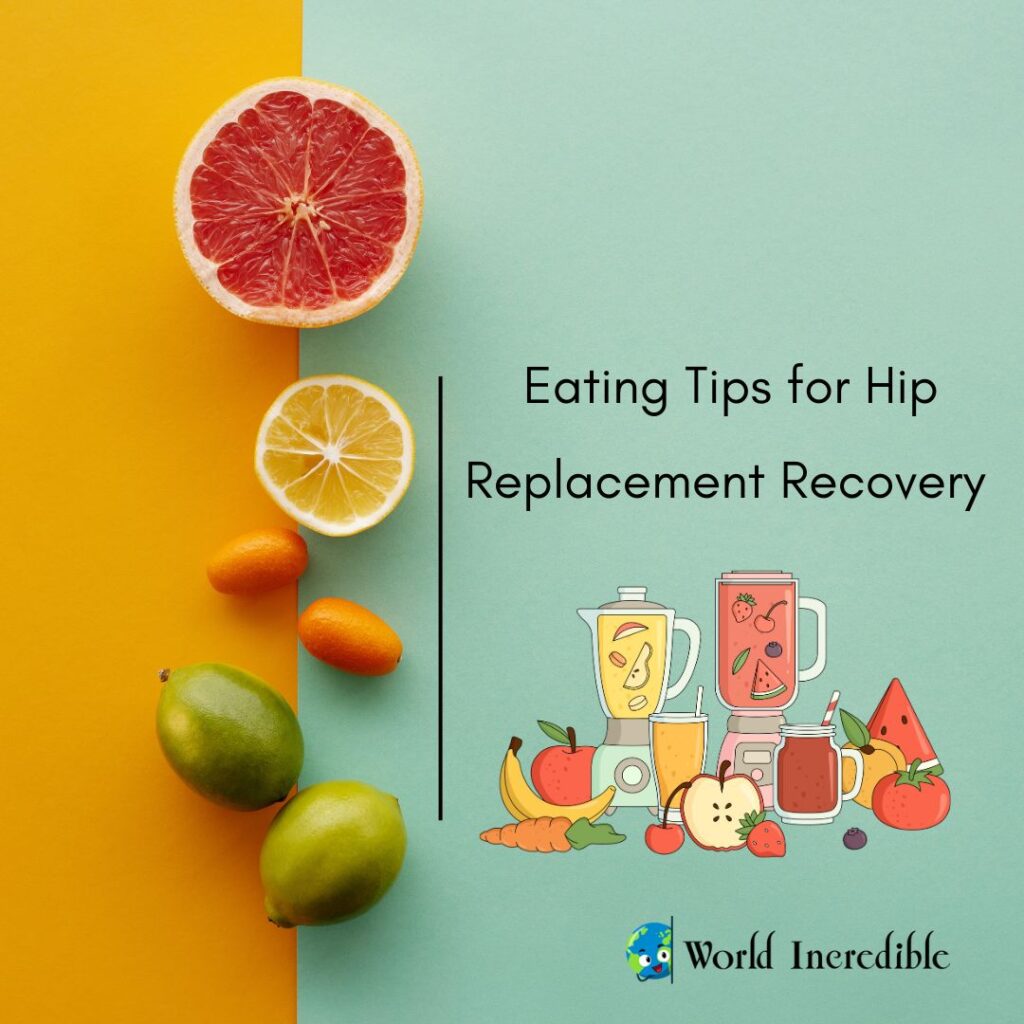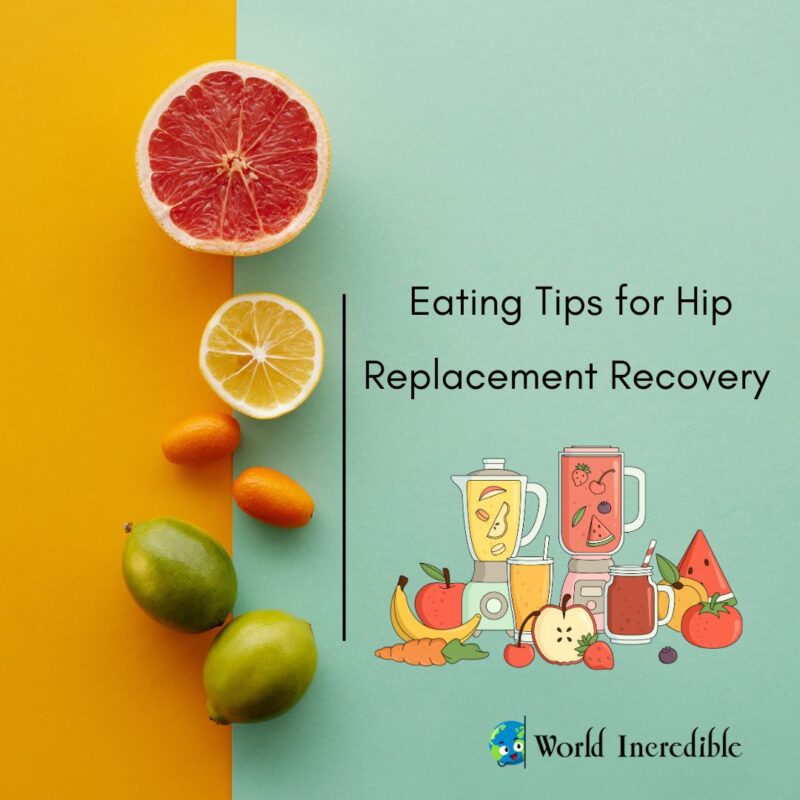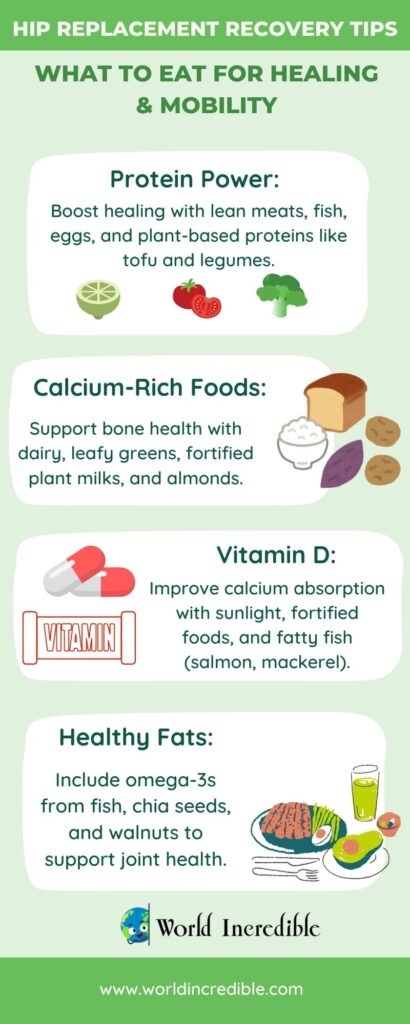If you’ve ever undergone hip replacement surgery, we understand how terrifying and concerning it might’ve been. You’d undergo massive lifestyle changes, preparing yourself for the worst, feeling overwhelmed by almost everything. The recovery process can feel like a life-long journey, and you probably have no clue what your body needs to heal properly. Here, we’ll talk about some hip replacement recovery tips centered on nutrition—the right diet you need to consume—that will speed up your recovery and get you up and moving even before you realize it.

Understanding Hip Replacement Recovery
First things first—hip replacement recovery doesn’t happen overnight. It requires a good amount of patience and consistent effort. Your body will go through a lot of changes as it adjusts to the new hip, and the recovery period will vary from person to person. However, one thing that remains constant is that the right nutrition plays a critical role in how quickly you heal and how effectively you regain mobility.
So, let’s start with a simple hip replacement recovery tip: nutrition is the foundation of your recovery. The right foods provide your body with the essential nutrients that support healing, reduce inflammation, and promote muscle strength. On the other hand, the wrong foods could slow the recovery process down or even cause unnecessary complications.
Hip Replacement Recovery Tips: What To Eat During Recovery
There are a few essential hip replacement recovery tips to follow. This will help you figure out what you need to eat during recovery. The following types of nutrients play a significant role in your recovery.
- Protein
Protein is beneficial for tissue repair and muscle growth, both of which are key during hip replacement recovery. After the surgery, your body needs more protein to repair the muscles and tissues around the hip joint that may have been impacted. Protein also helps in the healing of wounds and in boosting the immune system.
- Best Sources of Protein:
- Lean meats (chicken, turkey, lean beef)
- Fish (salmon, tuna, sardines)
- Eggs
- Tofu and tempeh
- Beans and lentils
- Greek yogurt
- Nuts and seeds
If you’re searching for hip replacement recovery tips, focusing on essential nutrients is key. Including these in your meals will provide your body with the necessary amino acids it needs to rebuild and recover effectively.
- Calcium
One of the most important things to consider after a hip replacement surgery is the health of your bones. Calcium plays a major role in bone strength and regeneration, so ensuring you get enough of it will support the healing of the bone surrounding the replacement. Calcium also works well alongside Vitamin D to strengthen your bones.
- Best Sources of Calcium:
- Dairy products (milk, yogurt, cheese)
- Leafy green vegetables (kale, bok choy, broccoli)
- Almonds and other nuts
- Fortified plant-based milk (almond, soy, oat)
- Tofu made with calcium sulfate
- Omega-3 Fatty Acids: Reducing Inflammation
Hip replacement surgery can cause inflammation in the body, which may make healing slower and more painful. Omega-3 fatty acids are well-known for their ability to reduce inflammation. Adding these to your diet can promote a smoother recovery process, reduce swelling, and even improve joint function.
- Best Sources of Omega-3s:
- Fatty fish (salmon, mackerel, sardines)
- Chia seeds and flaxseeds
- Walnuts
- Hemp seeds
- Plant oils (flaxseed oil, chia oil)
- Vitamin C: The Healing Vitamin
Vitamin C is essential for tissue repair, immune function, and the formation of collagen. After a hip replacement surgery, it’s important to get enough Vitamin C to support tissue repair and speed up recovery.
- Best Sources of Vitamin C:
- Citrus fruits (oranges, grapefruits)
- Bell peppers (especially red)
- Strawberries
- Kiwi
- Broccoli
- Tomatoes
- Fiber
During your recovery, pain medications and a decrease in physical activity can slow down digestion. Constipation is a common side effect, and fiber is a key player in promoting healthy digestion. Fiber also supports overall health by regulating blood sugar and improving gut health.
- Best Sources of Fiber:
- Whole grains (brown rice, oats, whole-wheat bread)
- Fruits (apples, pears, berries)
- Vegetables (sweet potatoes, carrots, broccoli)
- Legumes (beans, lentils, chickpeas)
- Nuts and seeds
Foods to Avoid During Hip Replacement Recovery
Just as there are foods that promote healing, there are also foods that could slow down recovery or even cause complications. Let’s go over some of the foods you should avoid:
- Processed Foods and Refined Sugars
Highly processed foods and sugary treats can increase inflammation, which can slow down the recovery process and even lead to complications. These foods often lack the essential nutrients your body needs to heal and can also cause weight gain, which puts extra strain on the new hip joint.
- Examples to Avoid:
- Fast food
- Sweets (cakes, candies, cookies)
- Sugary drinks (sodas, energy drinks)
- Chips and processed snacks
- Pre-packaged meals with preservatives
- Excess Salt
Too much salt can lead to water retention, high blood pressure, and other complications that can interfere with your recovery. It’s also important to avoid excessive sodium intake, which can cause your body to retain more fluids, leading to swelling around the surgical site.
- What to Avoid:
- Canned soups and vegetables with added salt
- Frozen meals with high-sodium
- Salty snacks (pretzels, chips)
- Processed meats (bacon, sausage, deli meats)
- Alcohol
Alcohol can interfere with the healing process by affecting your liver function, interfering with medications, and even increasing the risk of falls during recovery. It can also contribute to dehydration, which can slow the healing process and increase swelling around the joint.
- Recommendation: Limit alcohol intake or avoid it entirely during your recovery. Always consult your doctor about what’s best for you.
Sample Meal Plan for Hip Replacement Recovery
In these hip replacement recovery tips, we’ve covered what you should eat and avoid, let’s put it into practice. Here’s a sample meal plan to guide you:
Breakfast:
- Option 1: Oatmeal with chia seeds, almond milk, and fresh berries
- Option 2: Scrambled eggs with spinach and whole-grain toast
Mid-Morning Snack:
- A handful of mixed nuts (walnuts, almonds, and cashews)
- A small orange or a handful of strawberries
Lunch:
- Option 1: Grilled chicken salad with mixed greens, avocado, cherry tomatoes, and olive oil dressing
- Option 2: Quinoa with roasted vegetables (broccoli, bell peppers, zucchini) and grilled salmon
Afternoon Snack:
- Greek yogurt with honey and a sprinkle of flaxseeds
- Carrot and cucumber sticks with hummus
Dinner:
- Option 1: Baked salmon with roasted sweet potatoes and steamed green beans
- Option 2: Lentil soup with whole-grain bread and a side of steamed broccoli
Evening Snack:
- Herbal tea with a piece of dark chocolate
- A small handful of almonds
Fluids:
- Drink plenty of water throughout the day to stay hydrated
- Herbal teas or coconut water can be great alternatives for hydration
Hydration: The Importance of Drinking Enough Water
Staying hydrated is one of the simplest yet most effective ways to support recovery. Water helps reduce inflammation, prevent constipation, and improve the overall healing process. Aim to drink at least 8–10 cups of water a day, or more if you’re active or experiencing swelling. Avoid sugary drinks or excessive caffeine.
Consulting a Specialist for a Personalized Diet Plan
While these hip replacement recovery tips provide a solid foundation, it’s important to remember that everyone’s needs are unique. Always listen to your doctor. And whenever you have doubts, pick up a phone and contact your healthcare provider for advice. Follow your diet routine by hiring an experienced nutritionist who can develop a personalized diet plan based on your specific recovery needs.













